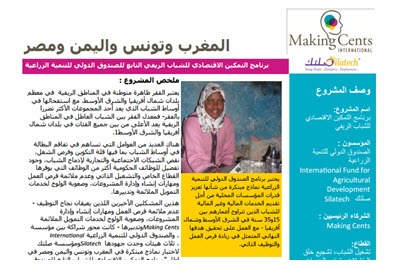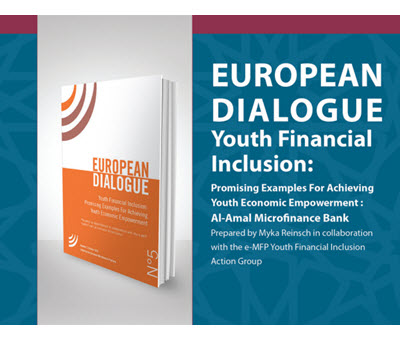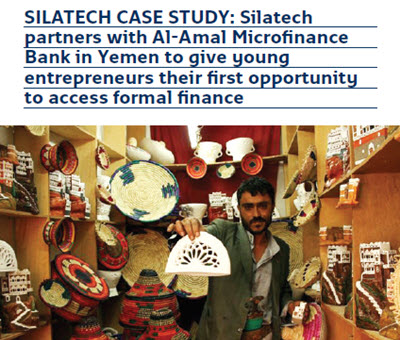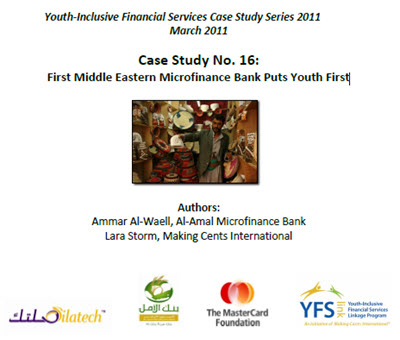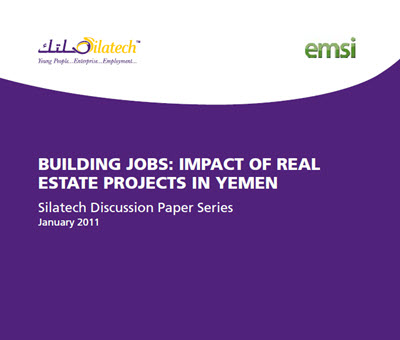-
Silatech pacts with Education For Employment and Al Amal MFI to foster youth economic empowerment to over 41,000 youth in Yemen amid conflict and humanitarian crisis
Sep 04, 2022Silatech, an international socio-economic development non-profit organization that connects youth to jobs and economic opportunities, has launched a new project “Mustaqbalak” in Yemen, to support over 41,000 youth economically through the provision of financing to facilitate the creation and sustainability of income generating businesses. Mustaqbalak, or “Your Future” is a three-year project, that is being implemented in partnership with Education for Employment Foundation and Al Amal Microfinance Bank. The project utilizes digital solutions to provide financial inclusion for youth led startups and struggling micro-enterprises in the commercial and service sector. The United Nations has described Yemen as the world’s worst humanitarian and development crisis. Millions of Yemenis continue to suffer from the conflict, trapped in poverty with limited possibility for employment and livelihoods. Yemen continues to be plagued by the conflict since 2015 which in addition to loss of lives, is tearing apart livelihoods and disintegrating the socio-economic fabric, causing Yemen to teeter on the brink of famine. According to the United Nations Development Program (UNDP), by 2030, the number of people living in extreme poverty in Yemen will surge to 22 million, approximately 65% of the population. Hassan Al Mulla, Silatech CEO said “We are delighted to partner with Education for Employment and Al Amal Bank to implement this new project in Yemen. Despite the ongoing war, we believe in the power of young men and women to bring about positive change and thrive in devastating times. We have witnessed before the huge impact of the MSME sector in creating economic opportunities for youth and contributing towards economic stability. This gives us confidence that Mustaqbalak will reduce vulnerability of the youth to the conflict and enhance their resilience in the face of adversity.”. The project will see more than 25 200 young Yemenis from the country’s nine governorates (Sana’a, Dhamar, Ibb, Taiz, Aden, Hadramaut, Al Hudaydah, Hajjah and Amran) start or expand their income-generating businesses, before it is rolled over to the rest of the country further placing 16,400 youth into employment within those businesses. The project is a step forward towards Silatech’s continued endeavors to empower young men and women, and its strategic goal to empower +5 million youth globally.Read More -
IFAD Rural Youth Economic Empowerment Program
Oct 30, 2013This project overview explains the IFAD Rural Youth Economic Employment Program, which aims to increase the employment and self-employment of youth aged 15-35 in Morocco, Tunisia, Yemen and Egypt by 2016. Rural poverty is endemic in most of the Middle East and North African countries and youth are one of the groups that suffer most – unemployed rural youth have one of the highest incidences of poverty of all groups in MENA. There are many drivers for youth unemployment, including training and labor market mismatch, lack of social and business networks for youth, a bias toward government jobs over private sector jobs and self-employment, inadequate employability and entrepreneurship skills, and insufficient access to and use of appropriate financial services and capabilities. These last two constraints to successful employment – inadequate employability and entrepreneurial skills and insufficient access to and use of appropriate financial services and capabilities - are the focus of a partnership between Making Cents International, the International Fund for Agricultural Development (IFAD) and Silatech. Together, we will test innovative models in Morocco, Tunisia, Yemen and Egypt in the “IFAD Rural Youth Economic Empowerment Program” that have potential for scale up and sustainability. In the process, the program aims to increase the employment and self-employment of youth aged 15-35 by 2016.Read More -
Al-Amal EU Dialogue
Feb 28, 2013This publication is a set of examples of promising youth financial inclusion programs from around the world. It outlines and compares the lessons emerging from them. The purpose of this publication is to contribute to the microfinance sector’s collective knowledge base by sharing examples of promising youth financial inclusion programs around the world and the lessons emerging from them. By sharing case studies that illustrate a variety of service combinations, approaches and delivery models, the European Microfinance Platform (e-MFP) seeks to provide the reader with useful reference points for offering savings, credit and non-financial services (especially training and mentoring) to youth. The following examples have been selected not to make a case for a particular approach and not necessarily because the organizations have the right formula – in most cases the products and initiatives are too recent for conclusions to be drawn about their long-term sustainability and demonstrable impact on youth lives and livelihoods. But members of the e MFP Financial Inclusion Action Group believe these cases offer valuable lessons learned and experiences to consider as the practice of youth financial inclusion expands and evolves.Read More -
Young Yemenis Accessing Formal Finance
Sep 30, 2011This case study reviews a joint Youth Loan Fund project undertaken by Silatech and Al-Amal Microfinance Bank (AMB) in 2009 to facilitate access to loan capital and non-financial support to young Yemenis aged between 18 and 30. Although financial sectors tend to be large relative to GDP across the Middle East and North Africa (MENA), access to financial services remains relatively restricted, especially for young people. Yemen is one of the most economically challenged countries in the Arab world, with average annual incomes of USD 1,100 and unemployment levels over 20 percent. Just 10 percent of the population have access to bank deposits. Young people make up a third of the country’s population and over 40 per cent are currently unemployed. They are being particularly excluded from formal financing by market bias against them, where older, more established clients are typically preferred over newer, younger ones. In response, Silatech established a strategic partnership with Al-Amal Microfinance Bank (AMB) in 2009 to launch a joint Youth Loan Fund to facilitate access to loan capital and non-financial support to young Yemenis aged between 18 and 30. The partnership has a specific objective to support young people through the transition from micro enterprise to small business, with a strong emphasis on long-term sustainability and job creation. For many of the young clients, these loans provide their first experience of formal finance. The terms of the partnership are based on Silatech’s microfinance team’s experience providing sustainable entrepreneurship support for young people in other parts of the world. For AMB, the combination of financial and non-financial support services is crucial to successfully providing credit to a youth client base. As a result, the bank has been able to waive its usual requirement of a six month minimum business operating experience to accept applicants with no prior experience or track record. Since December 2009, over 9,700 youth owned business have received formal financing for the first time, creating or sustaining an estimated 15,000 youth jobs. Youth loan products now constitute the bank’s fastest growingRead More -
First Middle Eastern Microfinance Bank Puts Youth First
Mar 31, 2011In this case study, Al-Amal Microfinance Bank discusses techniques for providing young people with appropriate financial services, including staff training and youth-friendly marketing and delivery channels. A pioneer in Islamic microfinance, Al-Amal Microfinance Bank (Al-Amal) was established in October 2008 as the first microfinance bank in Yemen. Dedicated to providing poor micro-entrepreneurs with access to financial services, Al-Amal targets youth and women with microcredit, savings, and insurance, among other services. To date, Al-Amal has developed two youth-friendly products, Youth Fund (credit) and Child Savers (savings). Through slight adaptations to its product offerings, including collateral requirements and minimum balances, Al-Amal has quickly grown its reach to thousands of Yemeni youth. By the end of 2010, Al-Amal had disbursed 6,317 loans to young entrepreneurs between the ages of 18 and 30 and had opened 8,833 savings accounts for children under the age of 18. In this case study, Al-Amal discusses techniques for providing young people with appropriate financial services, including staff training and youth-friendly marketing and delivery channels.Read More -
Building Jobs: Impact Of Real Estate Projects In Yemen
Jan 31, 2011This report quantifies the economic impact that innovative job training programs in the construction industry could have across the Yemeni economy, using the Al-Rayyan Hills construction project as an example. For the next generation of Middle Eastern workers, substantial barriers stand in the way of finding employment and opportunities to build fulfilling careers based on meaningful work. Among the many issues that exist, three particular stumbling blocks exist for workers, their employers and the country: a) A shortage of skills, and skilled workers, which constrains organisation growth and economic development; b) Lack of a structured entry process into the formal sector of the economy, which is crucial for career success but often difficult or impossible for workers who start in the informal sector as they wish to make the necessary transition; and c) Inadequate connection between supply and demand - private companies play an increasingly important role in shaping the market for in-demand skills, but have almost no voice in what skills are trained for because of current education and employment practices. Workforce skills need to be developed and deficiencies overcome to create flourishing economies. Private companies need skilled workers to expand, but they can’t afford to gamble with locally sourced, and potentially low-skilled, workers because of often restrictive and stringent practices around hiring and firing that limit their freedom to recover from hiring mistakes. These companies need assurance that the workers they hire have the needed skills to succeed, so they don’t take any unnecessary risks while hiring in domestic labour markets. Training that is tailored specifically to the needs of industries has the potential to address these issues. a) The skills constraint to growth can begin to be removed as training and the supply of skills increasingly conforms to specific company needs; b) Informal sector or first-time workers can be educated by an intermediary training provider, and thus have the potential to flow more easily into formal sector employment; and c) Workers could receive signals from the private sector about in-demand skills in a situation where the training provider is able to work directly with the companies actually hiring them. Silatech has sponsored a pilot training venture that follows this model in Yemen, which is engaged in providing construction skills training for Yemeni workers who are hired by private sector clients and projects. One such example includes a well known project in Sana’a: the Al-Rayyan Hills project. The training venture has the potential to provide lasting benefits to Yemen. It is now in a position to create a nucleus of activity and a proof point that, when scaled, could remove significant gaps between the Yemeni construction workforce and the private construction industry. This venture has specific benefits to young people, who are specifically trained with the objective of ensuring that the skills gained remain in the labour force over the long term, and thus benefit their families, communities and the national economy of Yemen. This report quantifies the economic impact that this sort of training could have across the Yemeni economy, and uses the Al-Rayyan Hills construction project as an example. This argument holds for other countries, and this approach is one that could be, and needs to, be replicated in other Middle Eastern countries as well.Read More


